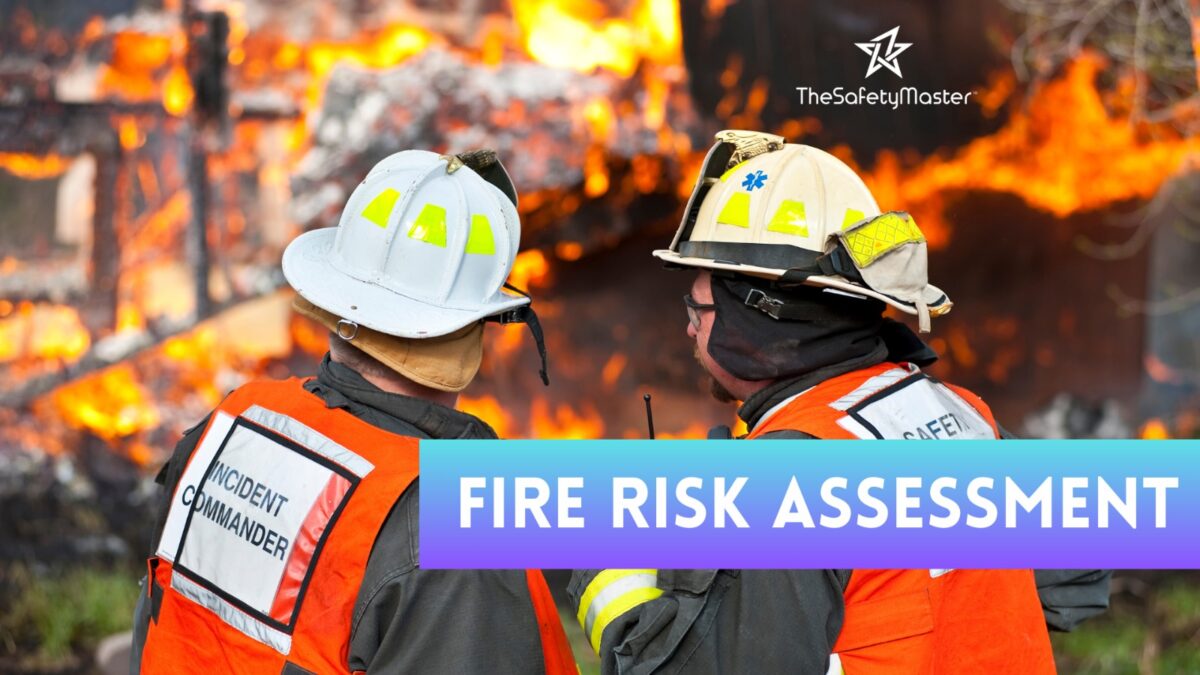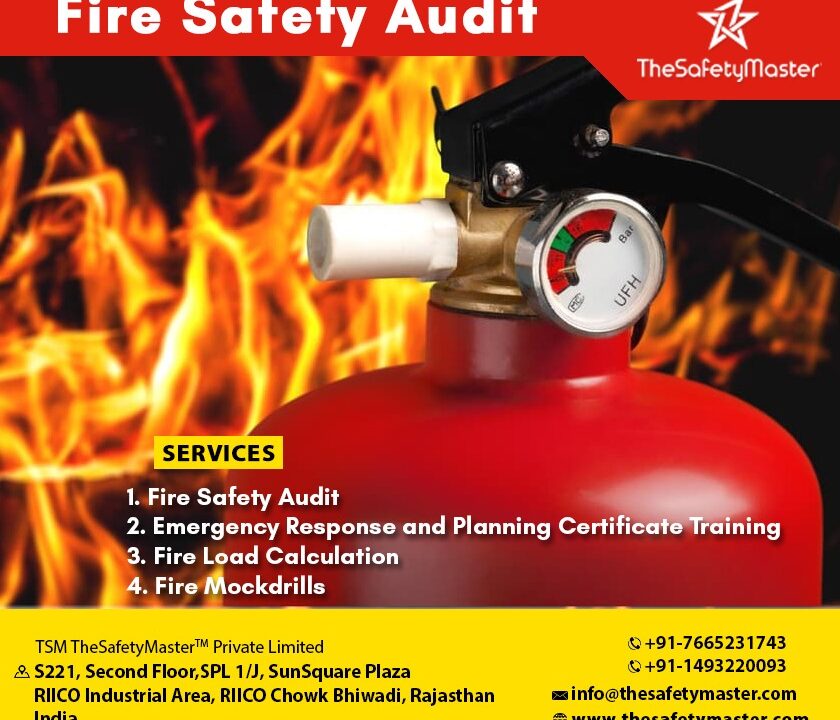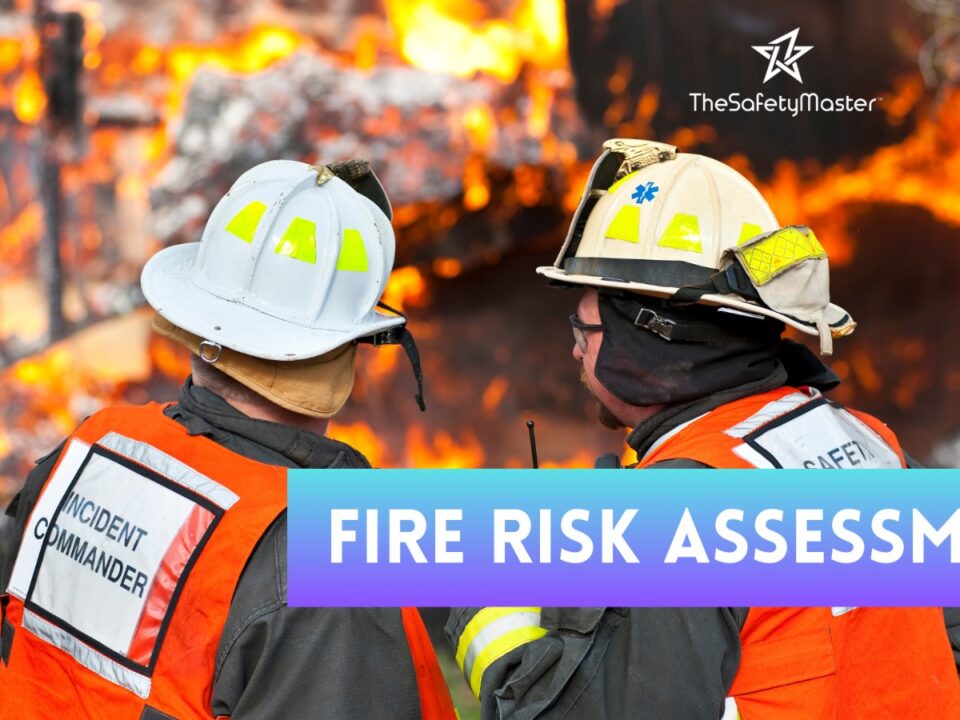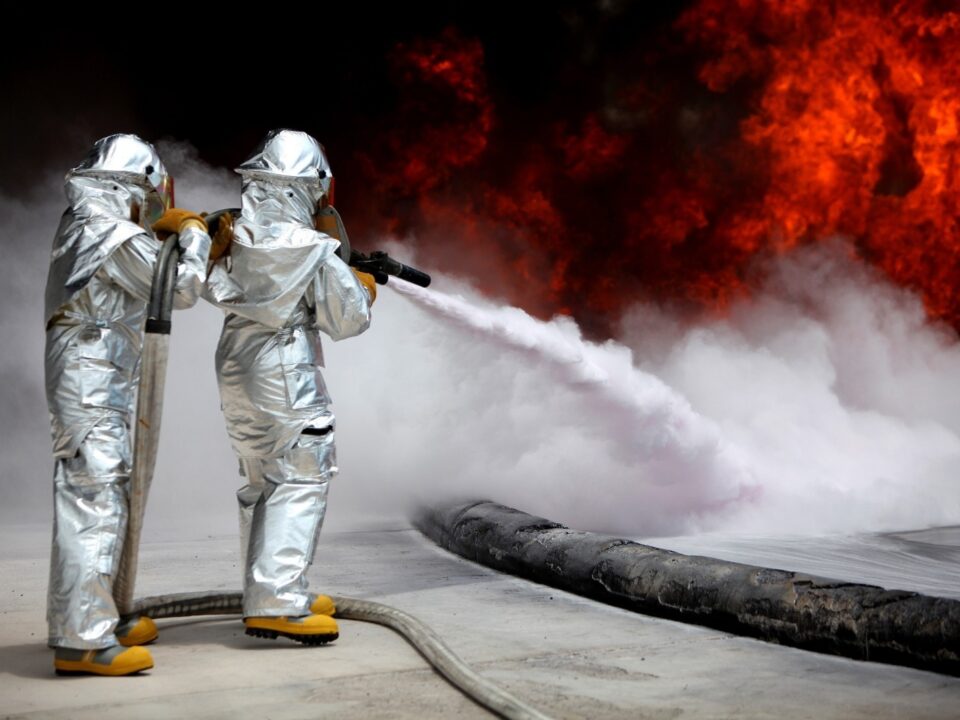Fire Risk Assessment in Indian Industries: Identifying Potential Hazards and Implementing Safety Measures

Crafting a Successful Behavior-Based Safety Implementation Program: Key Considerations and Best Practices
November 6, 2023
The Role of Quantitative Risk Analysis (QRA) in Process Industries: Assessing and Mitigating Potential Threats
November 6, 2023In this article, we delve into a crucial aspect of ensuring workplace safety in Indian industries – fire risk assessment. It is a topic of immense importance, as fire hazards can lead to devastating consequences if not detected and mitigated in a timely manner. Throughout the blog, we will explore the potential hazards faced by various industries, shed light on the importance of identifying these risks, and outline effective safety measures that can be implemented. By the end, you will gain a comprehensive understanding of fire risk assessment and how it can safeguard both lives and assets in Indian industries.
Introduction
Fire poses a significant risk to industries worldwide, and Indian industries are no exception. The potential for devastating fires can lead to loss of life, destruction of property, and severe disruptions to business operations. It is crucial for industries in India to conduct thorough fire risk assessments and implement appropriate safety measures to mitigate these risks. In this comprehensive article, we will delve into the realm of fire risk assessment in Indian industries. We will explore the various potential hazards that commonly exist in industrial settings, ranging from electrical systems and chemical storage to machinery and structural weaknesses. Moreover, we will discuss the essential steps that need to be taken in order to identify these hazards and effectively implement safety measures
Understanding Fire Risk Assessment:
Fire risk assessment is a fundamental process that allows industries in India to identify potential fire hazards and implement appropriate safety measures. It involves evaluating the likelihood of a fire occurring, as well as the potential consequences it may have on people, property, and the environment. By conducting a comprehensive fire risk assessment, industries can proactively address vulnerabilities and minimize the risk of devastating fires. A key aspect of understanding fire risk assessment lies in recognizing that fires can arise from various sources. These can range from electrical faults and chemical mishandling to structural weaknesses and equipment malfunctions. Assessing each of these factors enables industries to develop tailored strategies for mitigating risks effectively.
Moreover, fire risk assessment is not just about identifying hazards but also understanding their potential impact. This includes considering the vulnerability of employees, assessing the potential economic losses, and comprehending the ecological consequences that could arise from a fire incident. By gaining a holistic perspective on fire risks, industries can prioritize safety measures that protect lives, livelihoods, and the environment.
Embracing fire risk assessment not only promotes a culture of safety within Indian industries but also fosters resilience in the face of unforeseen emergencies. By diligently assessing risks and implementing appropriate measures to prevent fires or minimize their effects, industries send an optimistic message affirming their commitment to safeguarding their workforce and surroundings.
Importance of Fire Risk Assessment in Indian Industries
In the realm of Indian industries, the importance of fire risk assessment cannot be overstated. It serves as a fundamental tool in ensuring the safety and well-being of workers, protecting valuable assets, and preventing catastrophic incidents that could result in devastating consequences. Fire risk assessment acts as a proactive measure that enables organizations to identify potential hazards, evaluate their severity, and implement appropriate safety measures. By conducting thorough fire risk assessments, Indian industries not only comply with legal obligations but also demonstrate their commitment towards creating a secure working environment. This process allows businesses to effectively analyse their premises, operations, and procedures to pinpoint areas where fire hazards are most likely to occur. From flammable substances and electrical systems to machinery and structural vulnerabilities – no aspect escapes scrutiny during a comprehensive fire risk assessment.
Moreover, by emphasizing the importance of fire risk assessment in Indian industries, we foster a culture of safety-consciousness among employers and employees alike. This awareness encourages everyone involved to actively participate in maintaining an environment that prioritizes preventive measures against fires. By investing time, resources, and efforts into this crucial exercise routinely, businesses demonstrate their dedication towards safeguarding lives and property.
Ultimately, recognizing the significance of fire risk assessment in Indian industries helps us create workplaces that instil confidence in employees while fostering a sense of security. It is through this proactive approach that we can inspire optimism for a future where incidents are minimized or even eliminated entirely – where both personal well-being and business continuity thrive harmoniously.
Identifying Potential Fire Hazards in Indian Industries
In Indian industries, identifying potential fire hazards is crucial for ensuring the safety of workers and protecting valuable assets. One primary area of concern is electrical systems, which can be prone to faults and short circuits. Faulty wiring, overloaded circuits, and inadequate grounding are common issues that increase the risk of fires. To mitigate these hazards, regular inspections and maintenance of electrical systems are essential. Another significant source of fire hazards in Indian industries is the storage and handling of chemicals. Flammable substances such as solvents, fuels, and gases are commonly used in various industrial processes. Improper storage methods or inadequate ventilation can lead to chemical leaks or spills that may result in a catastrophic fire incident. Implementing proper storage guidelines, segregating incompatible chemicals, and providing adequate ventilation systems are effective measures to minimize the risk.
Machinery and equipment also pose a potential fire hazard if not properly maintained or operated. Frictional heat generated during operation can ignite flammable materials or substances nearby, leading to an uncontrollable fire outbreak. Regular lubrication, inspection of moving parts, installation of spark arrestors where necessary, and training operators on safe operating procedures significantly reduce the risk associated with machinery-related fires.
Identifying these potential fire hazards serves as a foundation for implementing effective safety measures in Indian industries. By proactively addressing these risks through proper training programs, regular inspections, adherence to safety standards, and employing advanced technologies like fire detection systems; industries can create a safer work environment for their employees while safeguarding their valuable resources against devastating fires.
Electrical Systems and Fire Hazards
Electrical Systems and Fire Hazards: The intricate electrical systems in Indian industries can be the source of potential fire hazards if not properly managed. Aging wiring, overloaded circuits, and faulty electrical equipment can ignite fires that spread rapidly within industrial premises. Furthermore, inadequate insulation or improper grounding of electrical installations can lead to short circuits and subsequent fires.
To address these concerns, it is essential for industries to conduct regular inspections of their electrical systems and equipment. Qualified electricians equipped with specialized knowledge should meticulously assess the condition of wiring, circuitry, and control panels. By identifying potential risks and promptly addressing them through necessary repairs or upgrades, industries can significantly mitigate the risk of fire accidents.
Notably, integrating advanced technologies such as smart meters and automated monitoring systems can greatly enhance fire safety in industrial settings. These technologies allow real-time monitoring of electrical parameters such as voltage fluctuations or abnormal currents. With timely detection of anomalies, industries can take proactive measures to rectify issues before they escalate into potential fire hazards.
By prioritizing regular inspections, maintenance programs, and adopting innovative solutions for fire prevention in their electrical systems, Indian industries can ensure a safer working environment while simultaneously boosting productivity and reducing downtime caused by unforeseen fire incidents.
Chemical Storage and Handling: Fire risks and Safety Measures
Chemical Storage and Handling: Fire risks and Safety Measures in the realm of Indian industries, chemical storage and handling pose significant fire risks that demand strict safety measures. The improper storage or mishandling of hazardous chemicals can lead to catastrophic consequences, including detrimental fires. Therefore, it is crucial for industries to implement effective safety measures to minimize the likelihood of such incidents.
One of the primary fire risks associated with chemical storage is the improper segregation of incompatible substances. Mixing two or more chemicals that react violently with each other can result in a sudden ignition or an explosive reaction leading to fire. To mitigate this risk, it is imperative to categorize chemicals based on their compatibility and store them accordingly in separate designated areas.
Additionally, proper ventilation plays a critical role in minimizing fire hazards in chemical storage areas. Adequate airflow helps prevent the accumulation of flammable vapours, reducing the chances of ignition. Installing ventilation systems equipped with spark arrestors and maintaining a controlled temperature within storage areas further enhances safety measures.
Moreover, ensuring that all containers are tightly sealed and labelled correctly allows for easy identification and helps prevent leaks or spillages that could potentially lead to fires. Regular inspections should be conducted to monitor any signs of corrosion or damage to containers that may compromise their integrity.
By implementing these robust safety measures for chemical storage and handling, Indian industries can significantly reduce fire risks while creating a secure working environment for employees. It is through proactive prevention strategies that we pave the way towards safer industrial practices – fostering not only productivity but also peace of mind for all stakeholders involved.
Machinery and Equipment: Fire Risks and Safety Measures
In the realm of Indian industries, machinery and equipment play a pivotal role in the efficient functioning of various sectors. However, they also pose significant fire risks if not properly managed. The interaction between heat-generating machinery and combustible materials demands a comprehensive approach to fire risk assessment. One key aspect is the regular inspection and maintenance of machinery to ensure that electrical components are in optimal condition. Faulty wiring or malfunctioning equipment can lead to electrical sparks, which can quickly escalate into a disastrous fire. Additionally, implementing automated shutdown systems and temperature monitoring devices can provide an early warning mechanism, preventing potential fire hazards.
Furthermore, proper storage and handling of flammable substances are essential for mitigating fire risks associated with machinery operations. Implementing clear protocols for storing fuels, lubricants, and other hazardous materials away from potential ignition sources is paramount. Adequate ventilation systems should also be in place to prevent the accumulation of combustible gases or vapours.
By adopting a proactive approach to fire risk assessment in relation to machinery and equipment, Indian industries can create safer working environments while still achieving high productivity levels. Prioritizing regular inspections, maintenance procedures, and training sessions empowers employees to contribute actively towards maintaining a secure workplace free from potential fire hazards. Ultimately, this commitment ensures that businesses operate smoothly while prioritizing the well-being of their workforce.
Structural Hazards and Fire Risks in Indian Industries
Structural Hazards and Fire Risks in Indian Industries: Indian industries often face structural hazards that can significantly increase the risk of fires. Dilapidated buildings, inadequate maintenance, and weak fire containment systems are some of the common issues found in industrial structures. These structural vulnerabilities can lead to rapid fire spread, hindering rescue operations and causing extensive damage.
Inadequate compartmentalization within industrial facilities is a grave concern. Insufficient fire-resistant walls or partitions can allow flames to spread quickly from one area to another, resulting in a larger fire incident. Additionally, compromised structural integrity due to age or poor construction practices can further exacerbate the risks associated with fires.
It is imperative for Indian industries to prioritize regular inspections and maintenance of their structures to mitigate these hazards. Implementing robust fire containment measures such as installing fire-resistant barriers and reinforcing building materials can greatly enhance safety. By investing in structural improvements, industries not only reduce the risk of fires but also create a safer working environment for employees, fostering productivity and instilling confidence among stakeholders.
Remember: A strong foundation builds resilience against potential risks; reinforcing structures is an investment that ensures the safety and longevity of Indian industries.
Emergency Preparedness and Response: Ensuring Safety in Case of Fire
Emergency Preparedness and Response: Ensuring Safety in Case of Fire in the realm of fire risk assessment, it is imperative to not only prevent fires but also be well-prepared for any eventuality. Emergency preparedness and response play a crucial role in ensuring the safety and well-being of individuals within Indian industries. With carefully crafted strategies and robust protocols in place, companies can effectively mitigate risks associated with fires.
To begin with, establishing clear evacuation procedures is paramount. This involves identifying safe assembly points away from potential hazards and providing employees with comprehensive training on evacuation routes and emergency exits. Conducting regular fire drills not only familiarizes personnel with evacuation protocols but also instils a sense of readiness, enabling them to respond swiftly and confidently in case of a fire emergency.
Furthermore, equipping workplaces with appropriate firefighting equipment is essential. Installing fire extinguishers strategically throughout the premises, alongside other firefighting tools such as sprinkler systems or hose reels, ensures that initial fire suppression efforts can be initiated promptly before the situation escalates. Regular maintenance checks must be conducted to guarantee the functionality and accessibility of these vital safety measures.
In addition to physical preparations, fostering a culture of safety-consciousness among employees is key. Educating workers about fire hazards specific to their industry, training them on how to detect early warning signs or unusual doors that may indicate an impending fire outbreak, empowers them to take proactive measures promptly. Encouraging employees to report potential risks or concerns regarding electrical systems, chemical storage areas, or equipment malfunctions cultivates an environment where everyone feels responsible for maintaining a safe workplace.
By prioritizing emergency preparedness and response measures within Indian industries, we can ensure that our workforce remains protected against potential fire hazards
Fire Safety Training and Education in Indian Industries
Fire Safety Training and Education in Indian Industries: Fire safety training and education play a crucial role in mitigating the risk of fires within Indian industries. It is imperative that all employees, from management to workers, receive comprehensive training on fire prevention, emergency procedures, and the proper use of fire safety equipment. By instilling a culture of safety consciousness, organizations can significantly reduce the occurrence and impact of fires.
Training sessions should cover various aspects such as understanding different classes of fires, knowing how to identify potential ignition sources and hazards specific to their industry. Employees should be trained on the correct operation of fire extinguishers and other firefighting equipment to ensure they can respond effectively in case of an emergency. Furthermore, they should be educated about evacuation procedures and the importance of maintaining clear escape routes.
By investing in regular fire safety training programs, organizations not only ensure compliance with legal requirements but also empower their workforce with crucial knowledge that can save lives and minimize property damage during fire incidents. Such proactive measures foster a sense of responsibility among employees toward maintaining a safe working environment. Ultimately, the collective effort put into fire safety training leads to improved overall safety standards within Indian industries.
Implementing Safety Measures: Roles and Responsibilities
Implementing Safety Measures: Roles and Responsibilities Within the realm of fire risk assessment, the implementation of safety measures is crucial for safeguarding Indian industries against potential hazards. This process entails a wide array of roles and responsibilities, collectively contributing towards maintaining a secure working environment. Chief among these is the role of management, which holds the responsibility for ensuring that proper fire safety protocols are in place. From appointing competent individuals to oversee fire prevention measures to conducting regular drills and inspections, management plays a pivotal role in upholding safety standards.
Additionally, employees themselves bear an essential responsibility in implementing safety measures. They must actively participate in fire safety training programs offered by their organizations, familiarizing themselves with emergency procedures and evacuation plans. By promptly reporting any potential fire hazards or concerns to their supervisors, employees can actively contribute to risk mitigation efforts.
Furthermore, government authorities also have a significant role in ensuring that industries adhere to stringent fire safety regulations. These regulatory bodies should conduct regular inspections and audits to assess compliance levels within different sectors. By providing guidance, assistance, and necessary resources to businesses, they can foster a culture of utmost vigilance when it comes to fire prevention.
Ultimately, the collaboration between management, employees, and government agencies creates an environment where everyone contributes towards implementing effective safety measures. By embracing this shared responsibility with enthusiasm and commitment, Indian industries can confidently protect their assets while empowering their workforce with a sense of security and well-being.
Regular Fire Safety Inspections and Audits
Regular Fire Safety Inspections and Audits: Fire safety inspections and audits play a vital role in ensuring the ongoing effectiveness of fire prevention measures in Indian industries. These routine assessments provide an opportunity to identify potential fire hazards, assess the adequacy of safety measures already in place, and address any deficiencies promptly. It is crucial to conduct these inspections regularly, as they serve as proactive measures to minimize the risk of fire outbreaks.
During a fire safety inspection, trained professionals thoroughly examine all areas of the industrial premises, including electrical systems, chemical storage facilities, machinery and equipment, and structural elements. They scrutinize for any signs of inadequate maintenance or potential sources of ignition. Additionally, audits focus on evaluating emergency escape routes, firefighting equipment readiness, and adherence to regulatory compliance.
By conducting regular fire safety inspections and audits in Indian industries, stakeholders can identify areas that require improvement or modifications to enhance overall safety levels. Prompt actions resulting from these assessments not only prevent potential accidents but also foster a culture of proactive risk management within organizations. Ultimately, this results in safer work environments that prioritize employee well-being while promoting sustainable growth for businesses.
Conclusion
In conclusion, it is evident that fire risk assessment is a crucial aspect of ensuring safety in Indian industries. By identifying potential hazards and implementing appropriate safety measures, businesses can significantly reduce the risk of fire incidents and protect both their employees and assets. Although the task may seem daunting, it is an essential responsibility that should be undertaken with utmost seriousness and diligence. With proper training, regular inspections, and a proactive approach toward fire safety, Indian industries can create a secure working environment that fosters productivity and prosperity for all. Remember, prevention is key – let us ignite a culture of fire safety in our industries to illuminate the path toward a brighter future.




